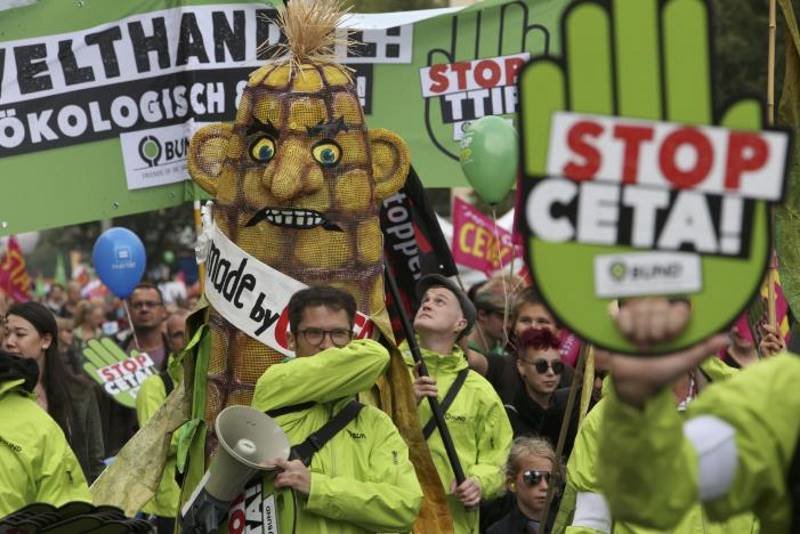
Organisatorerne en alliance af miljøgrupper, fagforeninger, og oppositionspartier - sagde at 320.000 mennesker deltog i demonstrationer i syv bedste byer herunder Berlin, Hamborg, München, og Frankfurt. Politiet anslog tallet til omkring 180.000.
Kommentar: Delvist oversat af Sott.net fra People power! Hundreds of thousands of Europeans protest against TTIP and CETA free trade deals
Smaller protests were also planned in other European cities, including Vienna and Salzburg in Austria and Gothenburg and Stockholm in Sweden.
In Berlin, demonstrators waved banners reading "STOPP CETA - STOPP TTIP", another placard said "People over profits".
The demonstrations are against the Transatlantic Trade and Investment Partnership (TTIP) with the United States and the Comprehensive Economic Trade Agreement (CETA) with Canada, currently being negotiated by the European Union's executive with the respective governments across the Atlantic.
Opposition in Europe to the trade deals has risen over the past year, with critics saying the pacts would hand too much power to big multinationals at the expense of consumers and workers by establishing arbitration courts to settle disputes between companies and governments.
"Horror stories"
EU Trade Commissioner Cecilia Malmstrom defended the planned trade deals and accused the opponents of deliberately heating up the debate with "horror stories and lies".
"The idea that TTIP will lower environmental standards is simply not true," Malmstrom told German daily Bild.
"Also the assertion that we'll be flooded with genetically modified food is simply wrong. Our democracy of course won't be undermined as some seem to believe."
Malmstrom said German exporters would benefit highly from the deals because they would reduce non-tariff barriers to trade. "This helps Germany and creates jobs," she added.
Comment: Malmstrom is simply toeing the party line. The people understand that the TTIP and CETA agreements will impose everything its opponents fear and more.
- The Truth behind the Transatlantic Trade and Investment Partnership (TTIP)
- How the TTIP will violate your human rights
- Secret TTIP document leak: A farewell to European Union farmers & the approval of GMO food
- EU defaulting to US colony? TTIP will abolish Europe's sovereignty
- Hot potato: TTIP leaked documents reveal plans for US corporate dominance in Europe
German Economy Minister Sigmar Gabriel, who faces crunch CETA vote on Monday by his Social Democrats (SPD), said that the trade agreements were Europe's best chance to shape globalization so that it served people and not only the interests of a few businesses.
"If CETA fails, then we'll not have another chance to shape globalization in this way for decades," Gabriel told Bild am Sonntag in an interview published on Saturday.
"Europe still is the biggest trading region in the world. We should use this power."
Comment: If Merkel herself can be compelled to actions totally against her country's interest, then good luck with that Mr. Gabriel.
Gabriel's SPD, junior coalition partner of Chancellor Angela Merkel's conservative, will vote on Monday whether to back the trade deal between the EU and Canada.
Gabriel, who is also vice chancellor and SPD leader, has championed CETA as part of his remit as economy minister, and to demonstrate the center-left party's business credentials.
But critics on the SPD's left wing are skeptical about the benefits of the deal and believe it would give multinationals greater access to European markets without creating jobs.
A failure to secure a majority of delegates at Monday's SPD convention in favor of the accord could scupper Gabriel's chances of standing as the party's candidate for chancellor in national elections next year.



Læserkommentarer
dig vores Nyhedsbrev